Aug 27, 2025 – North American West Coast Tour (5) Las Vegas
Hello. Today marks the fifth lecture of the North American West Coast tour, held in Las Vegas, located in the middle of the Nevada desert in the western United States.
At 5 AM, everyone did morning practice at their respective accommodations. After practice, they had a simple breakfast and discussed the day’s schedule together. They decided to rest and prepare personally before departing for Las Vegas at 10 AM.
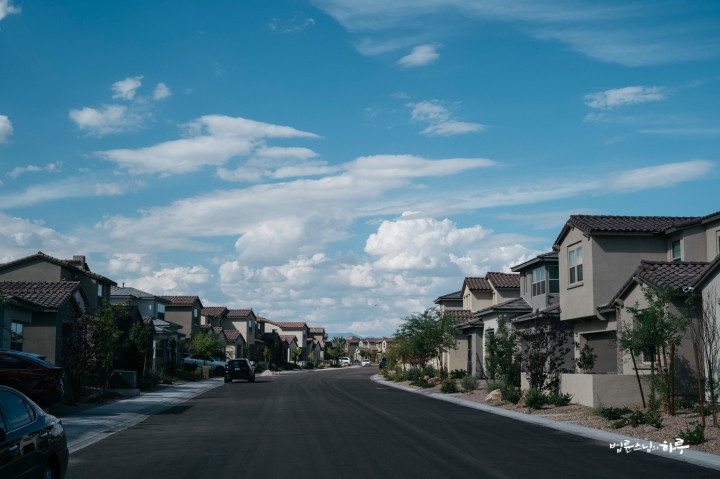
At 10 AM, before leaving for Las Vegas, Sunim briefly stopped by the home of Ms. Ko Bon-hwa, who lives nearby. Ms. Ko had provided accommodations whenever Sunim held lecture tours until last year, and she was someone who had built LA Jungto Society together with Park Myung-gwi, the first General Secretary. Ms. Ko served as the Secretary-General, while her spouse, Mr. Lee Seung-hoon, served as the President of LA Jungto Society. Ms. Ko couldn’t come to yesterday’s LA lecture venue in person due to her knee problems. When Sunim visited, she was extremely happy and showed tears. Sunim presented her with a framed picture of Buddha from the Bodh Gaya Stupa as a gift.
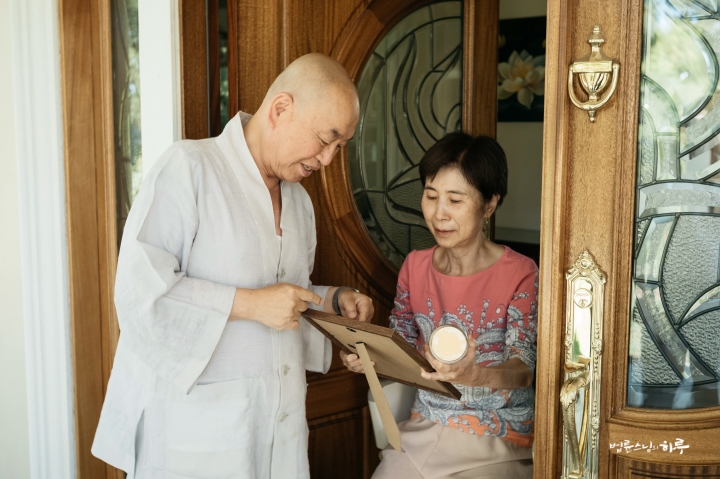
After greeting Ms. Ko, they departed for Las Vegas at 10:30 AM. They had to drive about 270 miles (approximately 435 km) for about 5 hours. During the journey, they had a simple lunch with sandwiches. Before long, they entered the desert road connecting California to Las Vegas. Cacti began to appear one by one across the desolate desert.
This section is an area densely populated with solar power plants, particularly along Interstate-15 highway where world-class power plants are located. Notable examples include the Ivanpah concentrated solar thermal power plant and the Desert Stateline solar panel facility.

Ivanpah is the largest solar thermal power plant in the United States, which began operation in 2014, while Desert Stateline started commercial operation in 2016 and has been providing stable power supply. The vast solar power plant could be seen in the distance. Through the car window, huge solar panels were sparkling, fully absorbing the hot desert sunlight. On the vast plain spread below the ridge, black panels stretched endlessly, allowing one to realize the enormous scale.

After briefly stopping at a rest area to use the restroom, they arrived at 3:30 PM at the home of Ms. Park Young-ok, where they would stay until today’s lecture. Ms. Park, who was in charge of organizing this lecture, had already gone to the lecture venue, and at the accommodation, Ms. Han Jung-won’s mother and Ms. Lee Eun-joo were waiting. The two warmly welcomed Sunim, who was visiting Las Vegas again after a year.
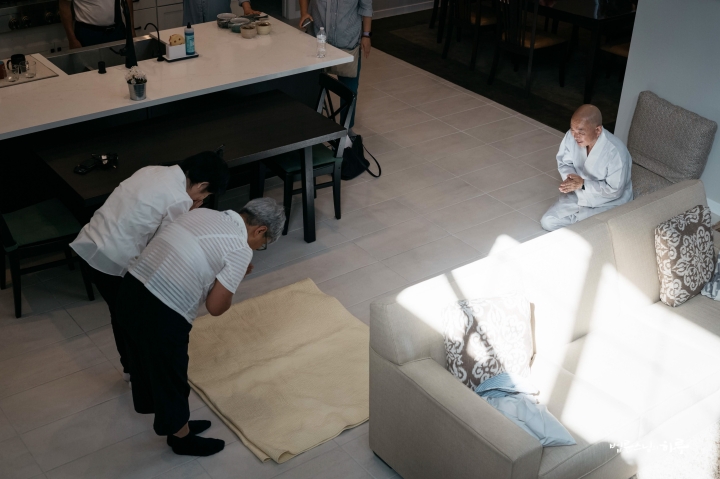
After taking a brief rest, Sunim had dinner and departed for the lecture venue at 6:10 PM. Today’s lecture was held at the Clark County Library located on Flamingo Road in Las Vegas. This public library provides various cultural and information services to local residents, and today it hosted Sunim’s Dharma Q&A lecture.
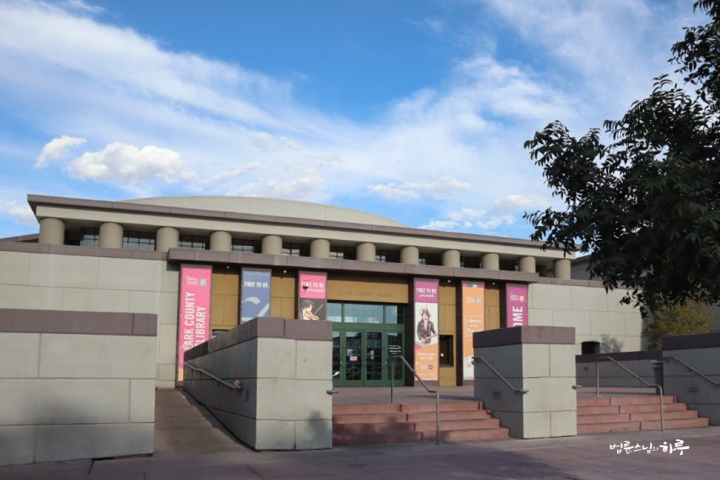
When they arrived at the lecture hall, volunteers warmly welcomed Sunim. The volunteers were also worried about what would happen if attendance was low, considering the venue had twice as many seats as last year.
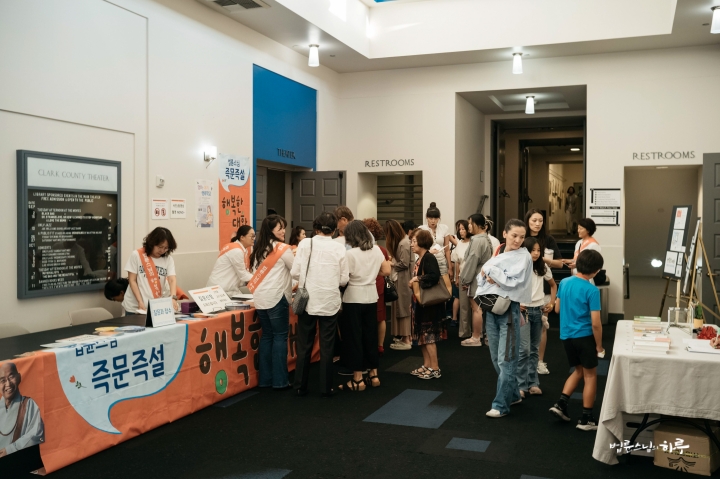
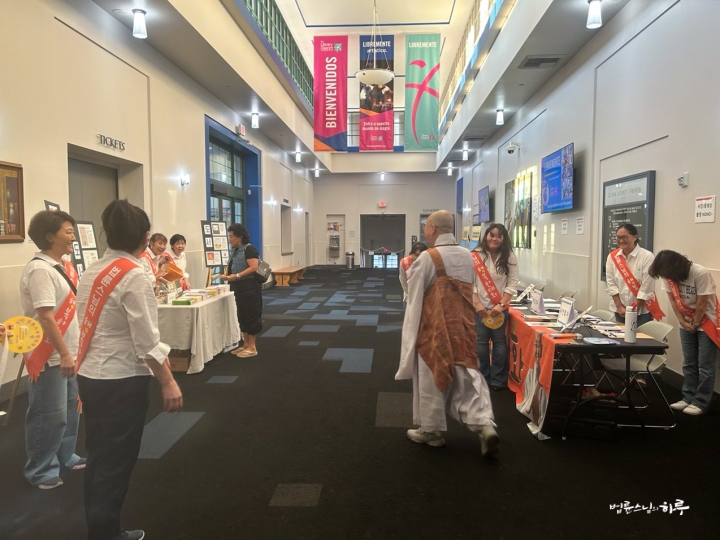
At 7 PM, Sunim walked onto the stage with about 140 audience members in attendance. Loud applause poured forth. Sunim smiled and gave his opening remarks.
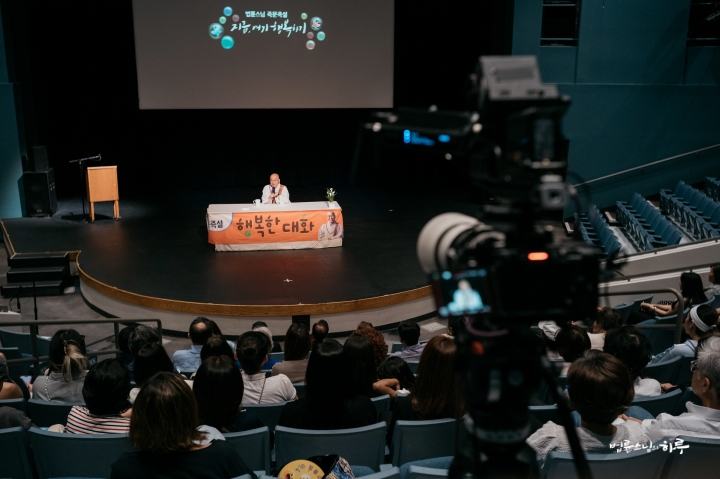
Why Does Happiness Turn Into Suffering?
“There is no right answer in life. So how should we live? We should live as we please. But the problem is that suffering arises even when we live as we please. Many people get married with blessings but then struggle because of marriage. They receive flower wreaths and congratulations for opening a store, but then suffer because of the store. They receive congratulations for getting a job and go to work, but soon find it hard to continue working. It’s not that disasters have struck to make things difficult; rather, happy and joyful events turn into suffering as time passes. Why does this happen? It seems like a contradiction that doesn’t make sense. Dharma Q&A is about bringing up these questions and stresses that arise while living life and having a conversation about them. Through such conversations, you might think, ‘Oh, it’s nothing special!’ or ‘I can do it this way!’ It can be seen as one way to solve life’s challenges.
In Buddhism, this is called ‘Dharma Talk’ or ‘beop-dam (法談).’ In traditional terms, it’s also called ‘yadan-beop-seok (野壇法席).’ Originally, inside temple halls, the format and topics of speech were restricted. So they set up a dharma platform in the temple’s outdoor courtyard where anyone could freely discuss any questions or topics – this became yadan-beop-seok. With many people gathering, it must have been quite noisy. This seems to be where the Korean expression ‘making a yadan-beop-seok’ (meaning ‘making a fuss’) came from. Today’s gathering is exactly such a yadan-beop-seok. Therefore, you can raise your hand and speak comfortably about any topic.”
Questions were not collected in advance but were taken directly from the audience. This actually created a more immediate atmosphere.
During the two hours, ten people were able to ask Sunim questions. One person who immigrated at age twenty and is now over forty asked Sunim for advice on what mindset to have as one ages to become a better adult.
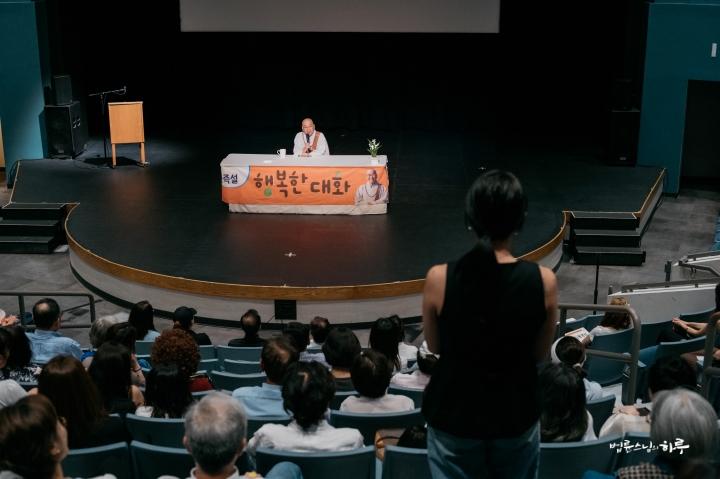
As I Get Older, How Can I Become a Better Adult?
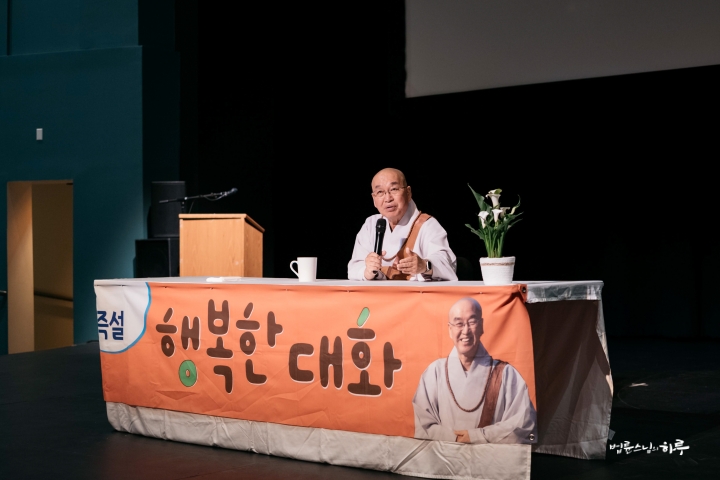
“You’re already living well as an adult. Just live as you are now. Nobody prepares in advance to become an adult. You seem to think ‘Was I unprepared for something?’ because you immigrated at twenty and your living environment changed drastically. That’s just lingering attachment to the past. Nobody prepares in advance to turn twenty, and the same goes for thirty. You just live and become twenty, then thirty. I’m seventy-three now, and I’ve reached this age just by living. I never even thought I’d become a seventy-year-old elder like this. It just happened as I lived. Soon I’ll be called an eighty-year-old elder. As more time passes, I’ll lie in bed hearing ‘Sunim, please open your eyes. Please open your eyes,’ and then I’ll face death. Nobody prepares for death in advance and then faces it. That’s just how we live. (laughter)
However, we do need to be ready to accept the life given to us, whatever situation comes. For example, if I get married, I need to accommodate my partner more than when I lived alone. Of course, even when living alone, we live mindful of others’ opinions, but at least when I enter my room, I can do as I please. But when you get married, you have to accommodate each other even inside the room. Even with room temperature, one person might say it’s cold while the other says it’s hot. With the same food, one person might say it’s salty while the other says it’s bland. These differences in every aspect create conflicts. In such times, we must first acknowledge the other person who is different from us.
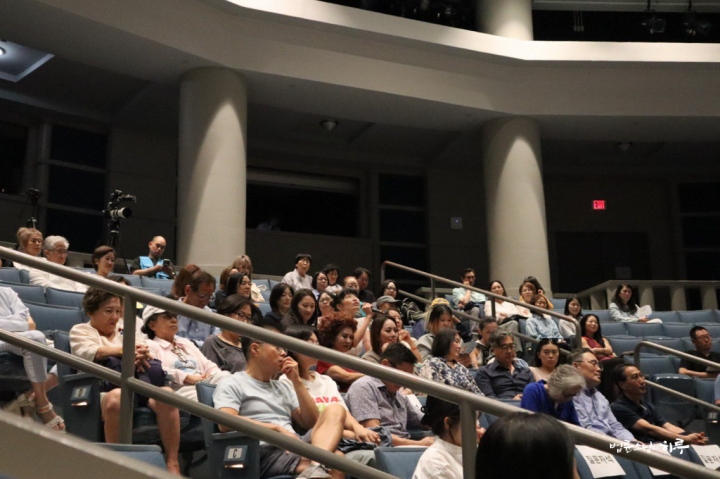
Next, you need to have the perspective of ‘They might think that way from their position.’ You should be able to view things like ‘From the wife’s perspective, she might think that way,’ ‘From the husband’s perspective, he might think that way,’ ‘Children might have that kind of viewpoint.’ If children only play games without studying, instead of scolding them first, you need to understand them by thinking ‘From the child’s perspective, it’s natural to enjoy games.’ This doesn’t mean playing games is a good thing. However, when we were growing up, we also heard a lot of nagging like ‘What will happen to our country when these kids who only read comic books, watch TV, and use computers grow up?’ But we’re living well now, aren’t we? Since you grew up that way yourself, you shouldn’t say such things to your children.
Since everyone naturally grows up this way, you don’t need to prepare for anything in advance just because you’re getting older. However, if you want to get married, preparation is necessary. The thought ‘I’m thirty, so I can get married’ is not right. Age is just a biological number. From an anthropological perspective, both parties need to be ready to adjust to each other. If you’re ready to adjust and live with someone, then you’re fully prepared for marriage. Even if you’re seventy years old, if you’re not ready to adjust to your partner, you’re not yet at the marriageable age. It’s an age when you shouldn’t get married. Since marriage is a choice, you need to have an attitude of taking responsibility for that choice.
If you immigrated at age twenty not by your own choice but following your parents, you have no choice but to adapt to the situation and live with it. However, if it was your own choice, you must take responsibility regardless of any difficulties. I didn’t choose to become a monk either. There was a temple next to the school I attended, and I became a monk half-forcibly because of the monk there. He told me, ‘If you don’t become a monk, you’ll die young.’ Still, after living as a monk for such a long time, even though I didn’t choose it, I think this life is quite good and I did well. Most people complain a lot even though they made their own choices. Although it wasn’t my choice, I’m living while accepting it positively.
Even if you came to America following your parents without preparation when immigrating, there’s no need to keep it in your heart and suffer. It seems like you thought you’d become a great adult when you turned forty. Are you married, by any chance?”
“Yes.”
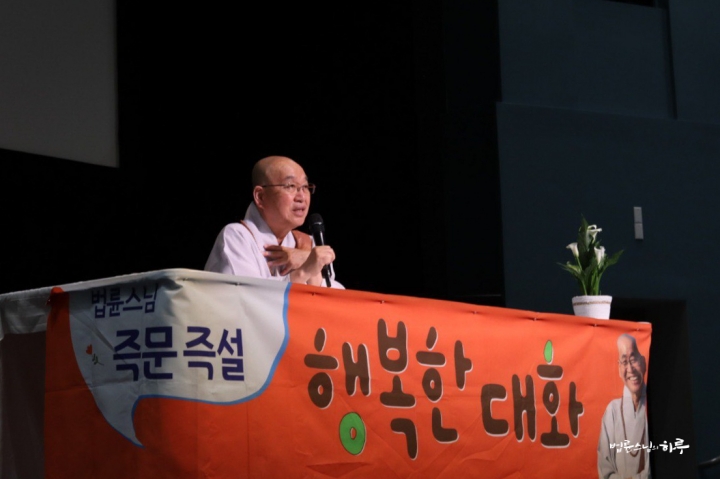
“Just live like that. Somehow you immigrated, somehow you got married, had children, and somehow you’ll turn fifty. You’ll live like that until you die. That’s how life originally is. If you attach too much meaning to it, life becomes tiring.”
“Thank you. I understand well.”
Questions continued one after another.
I often meet young people in their 20s who have a lot of anger these days. Since I feel a sense of alienation, I wonder if I should cut them off. How should I approach them?
Sunim said that mothers should raise their babies until they’re three years old, but I need to go to graduate school. Should I postpone my graduate school enrollment?
During the COVID pandemic, I talked a lot about Buddhism with my friends and I think Buddhism suits me well. Should I change my religion?
My 22-year-old son wants to join the military after graduating from college, but I’m against it. What should I tell him?
I immigrated to America and got a job as a nurse in the military. Work life is difficult because I can’t speak English well. I’m curious about how to overcome burnout.
Is Jungto Society raising disciples who can continue giving Dharma talks after Venerable Pomnyun Sunim passes away?
Even as the lecture was coming to an end, many people continued to raise their hands wanting to ask questions. Near the end, a woman who was worried about her son raised her hand and asked a question.
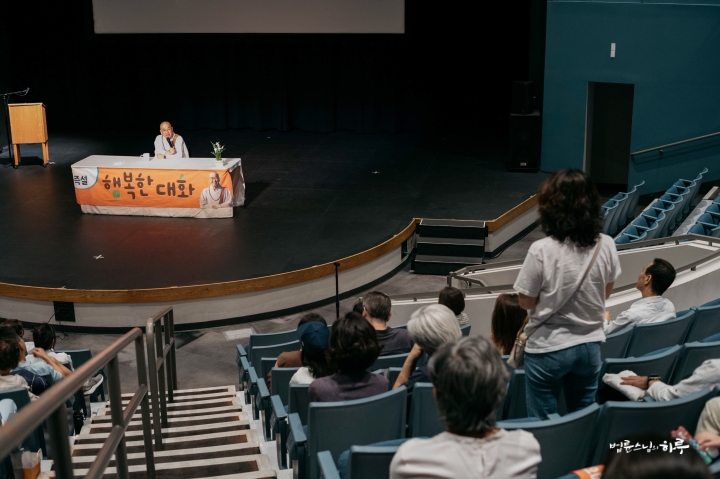
My Son Says His New Job Doesn’t Suit Him and He’s Struggling. I’m Worried He’ll Quit Again
“Ah, you’re having a hard time right now. Yes! If it’s hard, take a rest. You can just tell him this.”
“I’m worried that if I tell him to rest, he might quit his job again.”
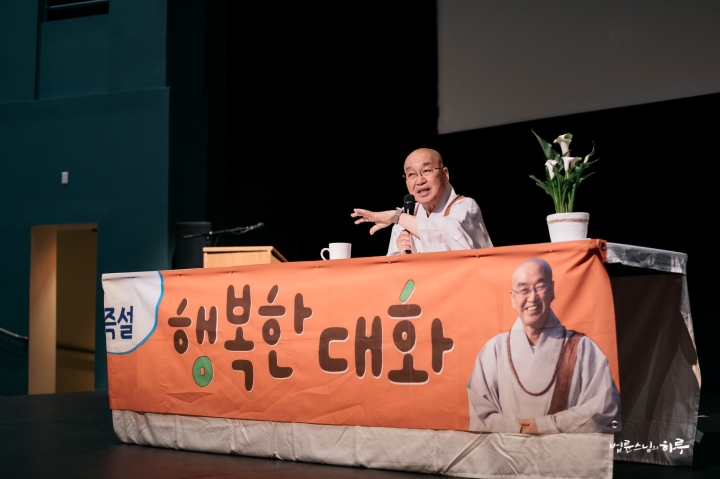
“If he quits, he can find another job after a while. Your son says it’s hard, so as a mother, you should tell him to rest. Someone like Venerable Pomnyun might say something different, but a mother’s role is simply to take care of her child. If you want to train this child to become an excellent person, that’s the job of a coach or teacher, not a mother’s role.
If a child is crying because of low grades, a mother should just pat their back, make them something to eat, and say, ‘It’s okay, rest a bit and you can do better on the next test.’ Taking issue with report cards is not a mother’s job. I’m not saying to just spoil them endlessly, but when a child is struggling, patting their back and comforting their heart is a mother’s job. Judging whether a child is talented or capable is what the neighbor lady does. If it’s someone else’s child, you can say things like ‘They’re good-looking’ or ‘They study well.’ But if it’s your own child, even if they’re not good-looking and don’t study well, a mother cares for them with love. If you talk about someone’s son is like this or that based on worldly standards, that’s the neighbor lady. If you actually check, you might not be the real mother but a stepmother. (laughter)
When your son says it’s hard, just say ‘If it’s hard, take a rest!’ If your son asks ‘What will I eat if I rest?’, tell him ‘You were born as a human, so you’ll find something to eat and survive.’ Also, will your son really rest just because his mother tells him to? He won’t go to work just because his mother tells him to, and he won’t quit just because she tells him to quit. He’ll go if it’s worth going, and quit if it’s worth quitting, so it’s better for the mother to say kind words.”
“Then should I just tell him to rest?”
“Even if you don’t tell him to rest, he’ll rest if it’s hard for him. Does your son change jobs frequently?”
“He’s changed twice so far. Before, when he said it was too hard, I told him it’s your life anyway, so you decide. Then he quit.”
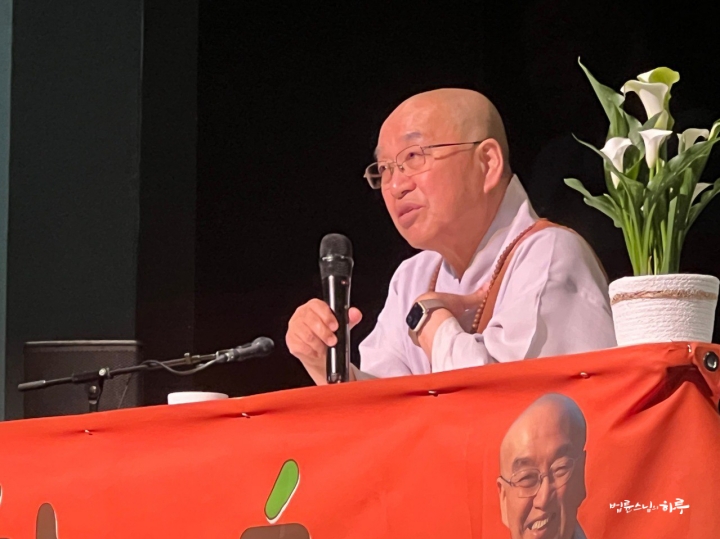
“Saying ‘it’s your life, so you decide’ is pushing the responsibility onto your son. You don’t need to tell your son who wants to work to quit, or tell your son who wants to quit to keep working. Just say ‘You’re having such a hard time. Come home. I’ll make you something delicious,’ and just listen to his struggles without mentioning whether he should quit or not. If your son continues to say he wants to quit two or three times after that, then tell him that quitting is also an option. I don’t think the mother needs to be the first to tell him to quit when he says it’s hard. But if he’s only changed jobs once or twice so far, you need to watch a bit more. Your son is in the process of finding a path that suits him. Finding one’s preferences or aptitude isn’t easy. That’s why you should be generous even if he changes jobs at least five times.
If similar patterns continue after that, you need to consider whether psychological issues might be the cause. Even then, don’t speak firmly as a mother, but suggest getting checked because he doesn’t look well, and indirectly guide him to get psychiatric counseling. It’s somewhat difficult for parents to notice their child’s psychological state. Because they see them all the time, they tend to have the perspective that the child has always been that way. On the other hand, someone like me or a psychiatrist can tell right away after just a few words whether this person has psychological anxiety or depression. If the child has psychological problems, it’s difficult for them to make decisions on their own, so helping them get hospital treatment or counseling is what a mother should do.
If your son has only changed jobs once or twice so far, it can still be seen as a process of finding his path. So it would be good to observe a bit more. If your son repeatedly fails to adapt and quits every time he changes jobs, then it would be necessary to help him get psychiatric treatment. However, since we’re not sure right now whether it’s maladjustment or a process of finding a path that suits him, it seems better to watch a bit more.”
“I understand. Thank you.”
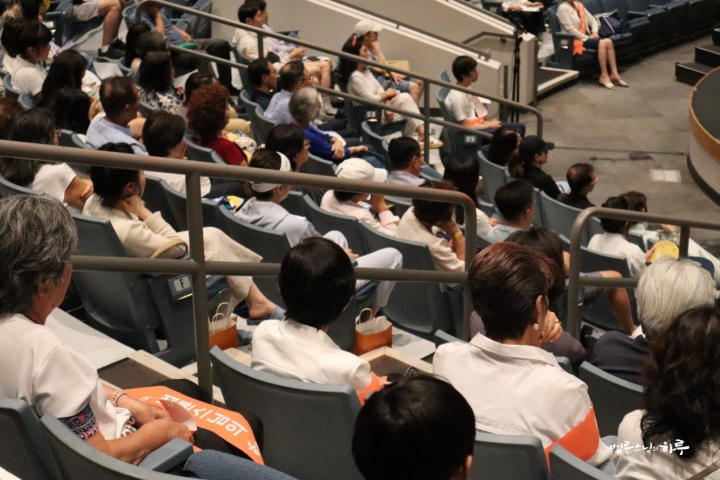
The lecture ended with loud applause.
A book signing session followed. Most of the audience who attended purchased Sunim’s books and lined up to get them signed.
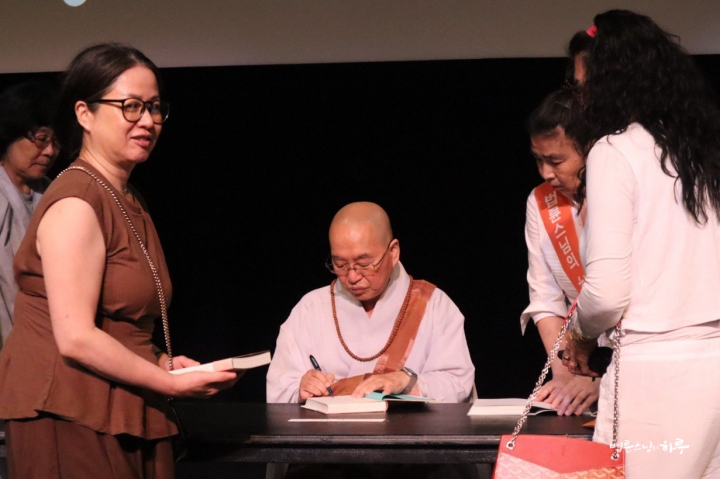
After all the audience members left, Sunim took a commemorative photo with the volunteers who prepared the lecture. Everyone worked hard to organize such a large event with a small number of people. More than half of the 20 volunteers today were handling lecture volunteer work for the first time.
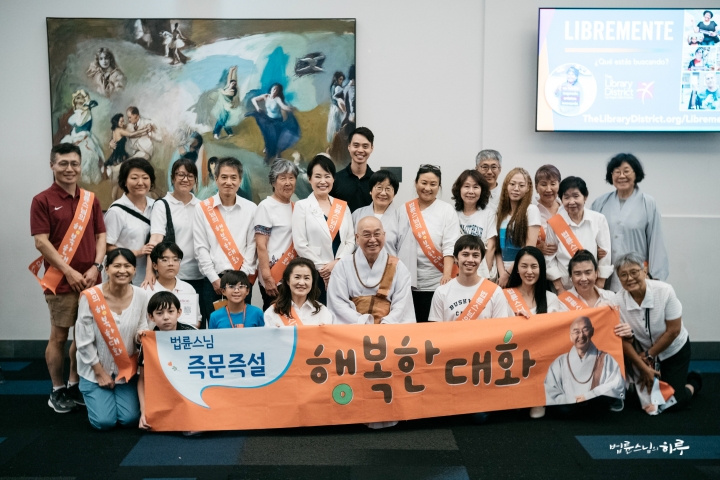
Sunim signed and gifted his books to Park Young-ok, who was in charge of the overall lecture coordination, and Han Jung-won, who served as deputy coordinator.
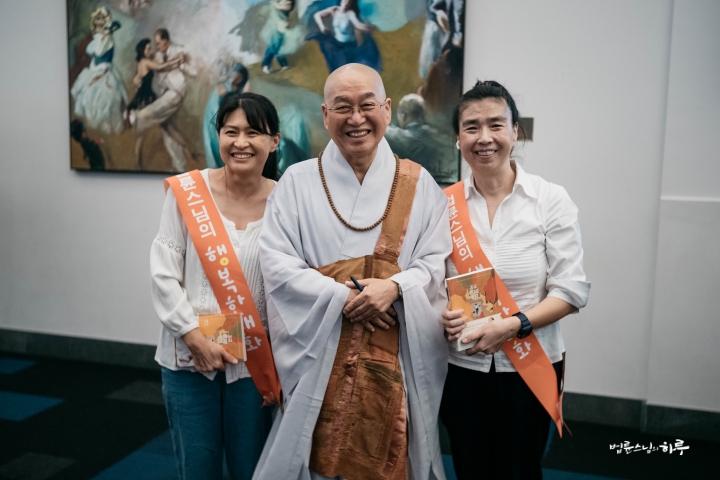
Among the volunteers were children and teenagers. Sunim took commemorative photos with the children and expressed his gratitude.
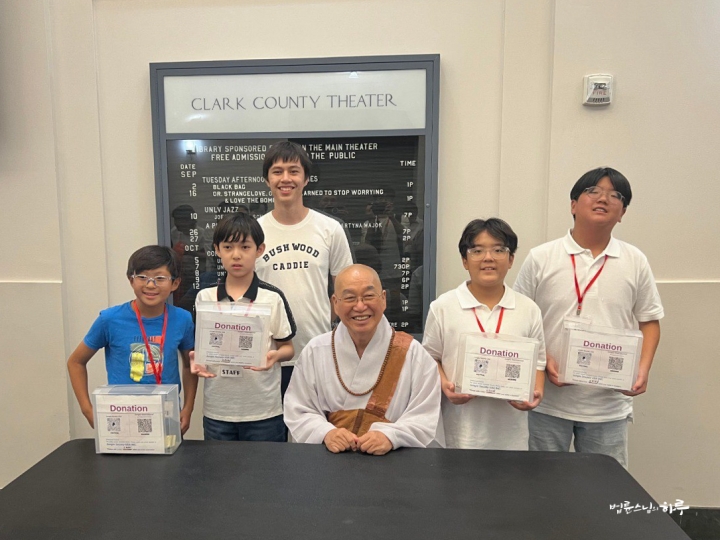
The volunteers had a mindful sharing session with Dharma Teacher Myodeok and Dharma Teacher Beophae.
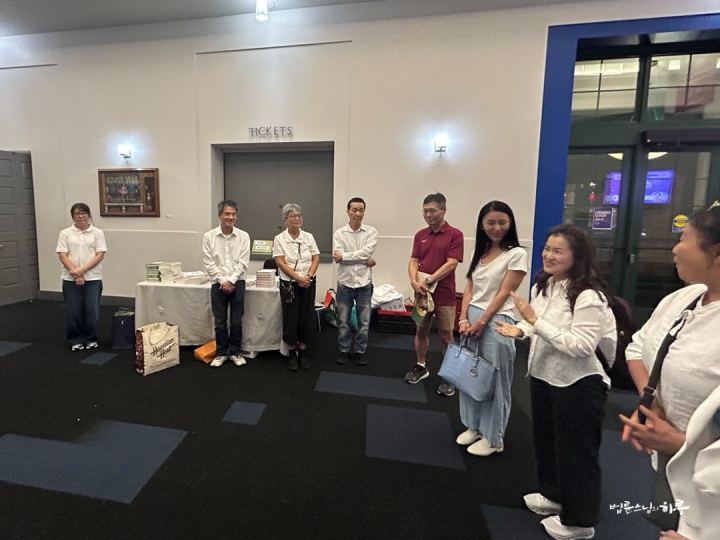
“I felt a bit disappointed that there weren’t as many attendees as expected. However, it was good to be able to spend time with fellow practitioners whom we don’t often have the chance to meet through this lecture.”
“An acquaintance also came to listen to the lecture and left in tears after hearing it.”
“I really hope Sunim will come again next year.”
Reflections filled with both gratitude and regret were shared. The volunteers also expressed their gratitude for Sunim’s continued rigorous schedule every day.
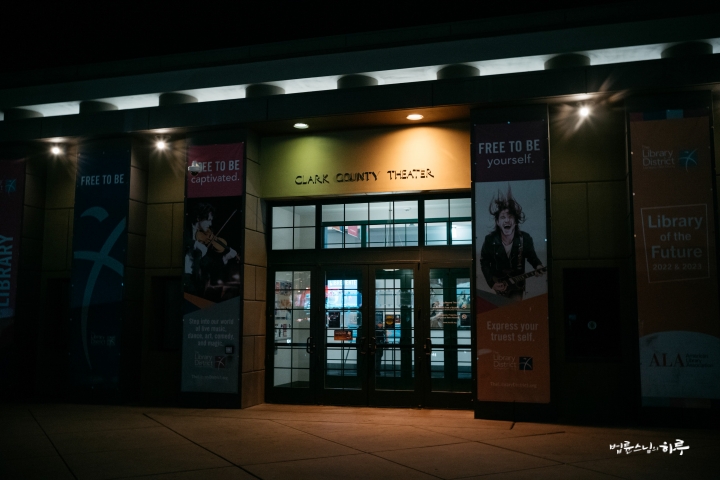
While the volunteers were having their mindful sharing session, Sunim briefly toured around the city. When the sharing session ended, at 10 PM, he got back in the car and departed Las Vegas for Los Angeles. After traveling 270 miles, about 435 km, by car throughout the night, he arrived at the accommodation at 1:30 AM.
Tomorrow afternoon, he will have an interview commemorating the 30th anniversary of Buddhist Door Global, an online English Buddhist journal. In the evening, as the final event of the North American West Coast lecture tour, he will give a lecture in Orange County and then depart for Sydney, Australia.





